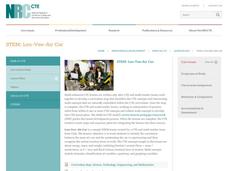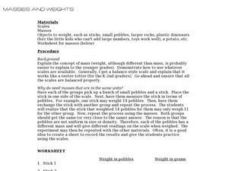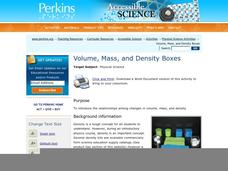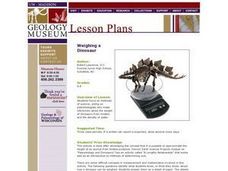Curated OER
Volume, Mass, and Weight
Study the difference between mass and weight. Your math group will compare the weight of an item to the amount of space that it uses. They'll then use conversion factors to find the difference between kilograms and pounds. Essential...
Teach Engineering
May the Force Be with You: Weight
Too much material will weigh you down. The sixth segment in a series of 22 highlights how weight affects a plane. Pupils learn that engineers take the properties of materials, including weight, when designing something.
Scholastic
Study Jams! Units of Measurement
As Mia and RJ discuss measurement, your class is introduced to the customary and metric systems for measuring mass, capacity, weight, and length. Temperature scales are also introduced. This resource can help set the foundation for later...
Curated OER
Mass, Volume, and Weight
Students explore mass, volume, and weight. In this science and measurement lesson, students compare volume, mass, and weight after listening to the teacher's description of each. Students explore different scales and balances and...
Curated OER
A Mass of Pennies
Learners estimate and determine the number of cents (pennies) that are needed to equal the mass of a variety of common objects. They develop a process for measuring and explore concepts related to units of measurement.
Curated OER
Mass vs. Weight
Students explore physical science by conducting a measurement experiment. In this mass instructional activity, students identify the differences between mass and weight and define a list of other vocabulary terms. Students utilize...
Teach Engineering
Bend That Bar
Bend it, but don't break it. Groups investigate the strength of different materials. Using a procedure in the seventh segment of a 22-part series on aviation, pupils determine how far a rod will bend. They determine the strength-to-mass...
National Research Center for Career and Technical Education
STEM: Lou-Vee Air Car
A comprehensive activity on acceleration awaits your physicists and engineers! Two YouTube videos pique their interest, then sample F=ma problems are worked and graphed. The highlight of the activity is the building of a Lou-Vee air car!...
Curated OER
Applied Science - Science and Math Post Lab
Learners utilize a balance scale. In this applied science instructional activity, students compare the weights of two objects using an elementary balance scale. Learners balance the scale with weights to find how heavy an object is.
Curated OER
Masses and Weights
Students explore the concept of weight and mass and the importance of units. Using a balance, they determine the weight of various objects in the unit of "pebbles" and in grams.
Perkins School for the Blind
Volume, Mass, and Density Boxes
Mass and density are difficult topics for kids to understand, and even more difficult when you have visual impairments or blindness. Learners will make boxes and fill them with cotton, sand, or crushed paper. They will feel the density...
Curated OER
Lesson-Mass and Weight
Student identify the three stationary positions, on the Earth, on the Moon, and in a house floating atop the cloud layers of Jupiter. They also identify the three orbiting positions, orbiting the Earth, orbiting the Moon, and orbiting...
Curated OER
Weighing a Dinosaur
Students role play as paleontologists who make inferences about the weight of dinosaurs. They use models and the density of water to make these inferences.
Kenan Fellows
Isotopic Pennies
Many people confuse atomic mass and atomic numbers. The sixth of seven lessons in a unit requires scholars to find the weight of different groups of pennies. Then, they must solve how many of each type of penny exists in a closed system...
University of Colorado
Modeling Sizes of Planets
The density of the huge planet of Saturn is 0.7 g/cm3, which means it could float in water! In the second part of 22, science pupils explore the size and order of the planets. They then calculate weight and/or gravity and density of...
Curated OER
Student Exploration: Weight and Mass
In this student exploration-weight and mass worksheet, student use the Weight and Mass Gizmo to answer questions and fill in charts with estimating and measuring.
CPO Science
Physics Skill and Practice Worksheets
Stop wasting energy searching for physics resources, this comprehensive collection of worksheets has you covered. Starting with introductions to the scientific method, dimensional analysis, and graphing data, these skills practice...
Curated OER
What Floats Your Boat?
Students are introduced to the concept of buoyancy. The Video used in this lesson plan demonstrates and explains the characteristics of objects that sink and float. It presents the concepts of displacement, weight, and buoyancy.
Curated OER
Too Heavy For Me
Students explore the different arrangement of air molecules in high and low air pressure masses. They compare the temperature of high and low pressure masses and discover how a barometer works.
Curated OER
Balanced Forces
Examples and practice questions will help real-life understanding of the Principle of Moments concept. These great slides define the types of levers and pivots, and then give examples of the typical seesaw situations that help the...
Curated OER
What is Air?
Learners investigate air by participating in a class experiment. In this matter measurement lesson, students identify air as a gas which consists of mass. Learners utilize a windsock or balloon to measure oxygen and explore it's true...
Lane Community College
Review Sheets: Introductory Physical Science
This hybrid worksheet connects mathematics to a science class. Learners practice solving problems that involve making a variety of conversions. An assortment of questions hits all the calculations needed for a middle school or beginning...
Curated OER
Vector Lab
Here is a math lab that helps young mathematicians understand the real-life meaning for vector addition. By building a model using spring scales and washers as weight, and then calculating the vector addition using two different methods,...
Curated OER
Sum of the Parts
Fifth graders build objects using various materials. They estimate the weight of the object using individual building pieces. Then they weigh the actual object and then tear it apart and weigh the pieces. They compare the two weights.























